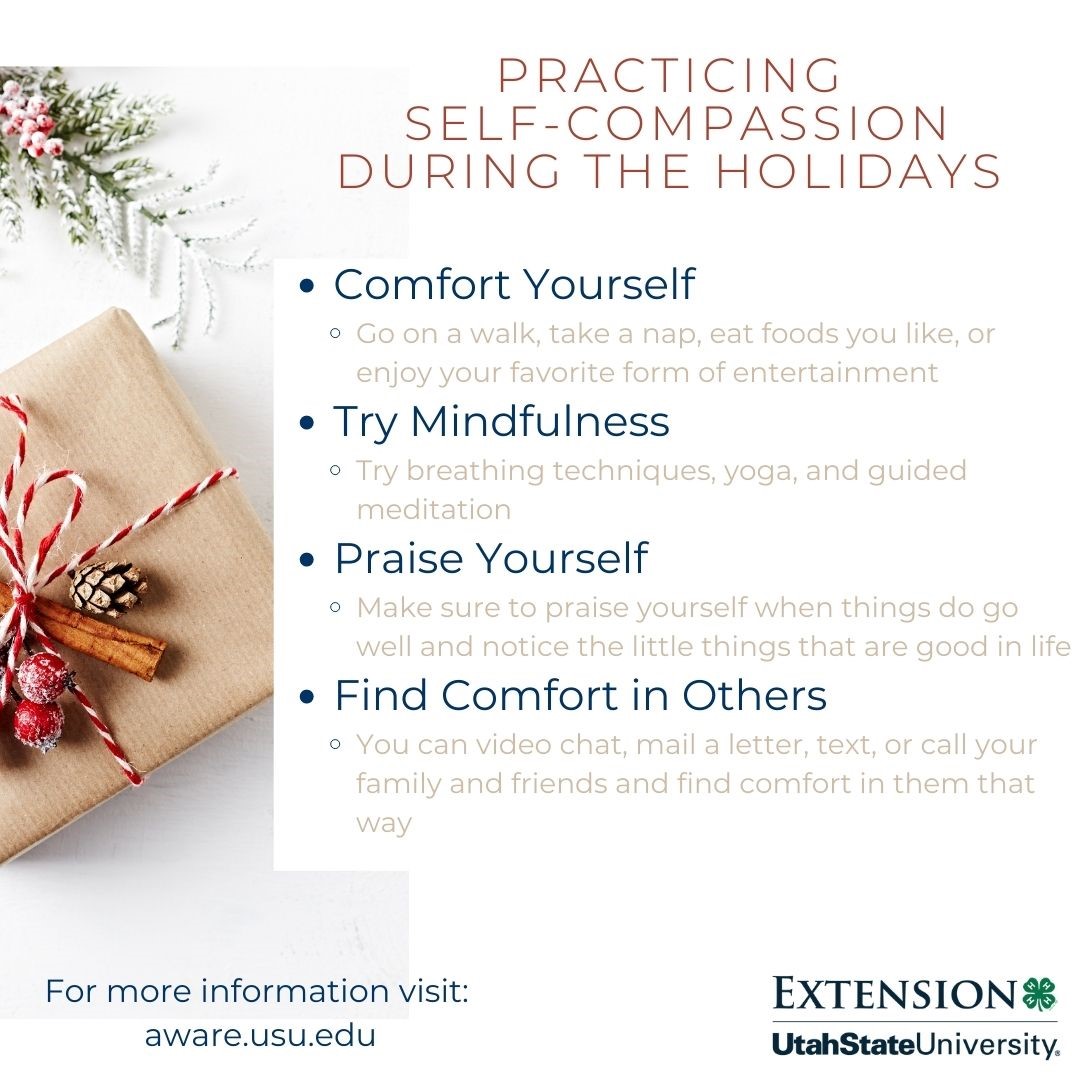Self-Compassion During the Holidays
Emma Campbell, Ashley Yaugher, and Tasha Killian

Introduction:
The holiday season can bring joy and good times, but it can also bring stress and difficult situations. Holiday stress can come from visiting family, financial stressors, and unreasonable expectations both from yourself and others. This year holiday stress may come from not being able to visit family, which can be a source of self-care for many people. A common saying is “you cannot pour from an empty cup,” this means that if you are not taking care of yourself, you cannot care as effectively for others or find joy as easily in your life. To combat holiday stressors and be kind to ourselves, we can practice self-compassion.
What is Self-Compassion?
Self-Compassion is recognizing that you are struggling, being sensitive to yourself, and then caring for yourself. When you are self-compassionate, you are just having compassion for yourself and accepting that you are human (Neff, 2020). Practicing self-compassion often can lead to better emotional health and less perceived stress (Stutts, Leary, Zeveney, & Hufnagle, 2018).
Four Ways to Practice Self-Compassion During the Holidays:
- Comfort Yourself: Being compassionate to yourself means comforting yourself. You know better than anyone what brings you comfort. When the holidays become overwhelming, do things for yourself like; going on a walk, taking a nap, eating foods you like, or enjoying your favorite form of entertainment (Harvard Health Publishing, n.d.).
- Try Mindfulness: Being mindful of yourself and your feelings is the first step to self-compassion. “We cannot ignore our pain and feel compassion for it at the same time” (Neff, 2020). You can become mindful of yourself by practicing mindfulness. There are many ways to be mindful, a few ways to practice mindfulness are; breathing techniques, yoga, and guided meditation. These techniques can help give you clarity and peace.
- Praise Yourself: We are often most negative towards ourselves and can bring ourselves down when something goes wrong. When things do not always go as planned during the holiday season, make sure to praise yourself when things do go well and notice the little things that are good in life (e.g., gratitude). Even when everything seems negative, look for the positive and encourage yourself, treat yourself as a friend, as those practicing compassion would do for you (Harvard Health Publishing, n.d.).
- Find Comfort in Others: Self-compassion means finding comfort for yourself, but that doesn’t mean you cannot lean on others for support. Being self-compassionate means you understand that sometimes you need other people to help you, and you let them. We may not have family and friends in-person during this holiday season to help like usual, but you can still find comfort in them. You can video chat, mail a letter, text, or call your family and friends and find comfort in them that way.
Conclusion:
There are many ways the benefits of self-compassion will be helpful during the holiday season. This year especially, being kind to ourselves can improve our emotional wellbeing as well as our interactions with others. Get started today and find what works for you to engage in self-compassion. Learn more about self-compassion and try some recorded practices with the resources below. Happy Holidays!
Resources:
Self-Compassion, Dr. Kristin Neff
How to Practice Self-Compassion, Positive Psychology
How to Find Relief from Holiday Stress, USU Extension
Holiday Self-Care Tips, Psychology Today
References:
- Harvard Health Publishing. (n.d.). 4 ways to boost your self-compassion. Retrieved November, 2020, from https://www.health.harvard.edu/mental-health/4-ways-to-boost-your-self-compassion
- Neff, K. (2020, July 09). Definition and Three Elements of Self Compassion: Kristin Neff. Retrieved November 19, 2020, from https://self-compassion.org/the-three-elements-of-self-compassion-2/
- Stutts, L. A., Leary, M. R., Zeveney, A. S., & Hufnagle, A. S. (2018). A longitudinal analysis of the relationship between self-compassion and the psychological effects of perceived stress. Self & Identity, 17(6), 609–626. https://doi-org.dist.lib.usu.edu/10.1080/15298868.2017.1422537



 Utah 4-H & Youth
Utah 4-H & Youth